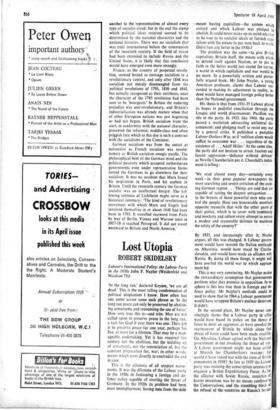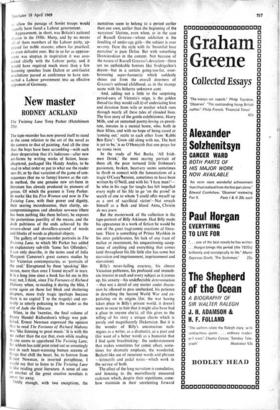Lost Utopia
ROBERT SKIDELSKY
'In the long run,' declared Keynes, 'we are all dead.' This is the most telling condemnation of political utopianism I know. How often has one come across some such phrase as 'In the long run peace can only be preserved by abolish- ing armaments and renouncing the use of force.' How very true this is—and trite. Men are not called upon to preserve peace in the long run, a task for God if ever there was one. Their job is to preserve peace for one year, perhaps for five, at most for a lifetime. That may be a man- ageable undertaking. Yet it has required this century not the abolition, but the building up of armaments, not the renunciation of, but the constant preparation for, war; in other words, means which seem directly to contradict the end in view.
This is the dilemma of all utopian move- ments. It was the dilemma of the Labour party in the 1930s in fashioning a foreign and de- fence policy capable of meeting the threat of Germany. In the 1920s its problem had been mass unemployment. Saving men from the dole ,..meant having capitalism—the system which existed and which Labour was pledged to abolish. It could never make up its mind whether to be true to its socialist ideals or furnish capi. talism with the means to put men back to work. Did it fare any better in the 1930s?
The problem was the same—to give British capitalism, Britain itself, the means with which to defend itself against Nazism, or to pin its faith in the better world just round the corner, a world in which capitalism and war would be no more. In a powerfully written and power. fully argued book, Mr John Naylor, a young American professor, claims that Labour suc- ceeded in making its adjustment to reality, in. deed would have managed foreign policy better than the National government.
His thesis is that from 1931-35 Labour placed its hopes in pea-ceful conciliation through the League and world disarmament. Pacifism was rife in the party. In 1933, like 1960, the party passed a resolution advocating unilateral dis- armament: and pledging itself to resist any war by a general strike. It published a pamphlet Labour Outlaws War, as if 'volition alone would suffice to overcome war . . regardless of the existence of ... Adolf Hitler.' At the same time, the party did not hesitate to attack fascism and fascist aggression—`defiance without defence' as Neville Chamberlain put it. Churchill's indict. ment is telling: 'We read almost every day—certainly every week—in their great popular newspapers the most searching and severe criticism of the exist- ing German regime ... Things are said that are capable of raising the deepest antagonism ... in the breasts of those powerful men who con- trol the people. How can honourable members opposite reconcile that with the other parts of their policy, which is to 'cover with contumely and mockery and odium every attempt to secure a modest and reasonable defence tb Maintain the safety of the country?'
By 1935, and increasingly after it, Naylor argues, all this was changed. A Labour govern- ment would have resisted the Italian onslaught on Abyssinia. would have stood by Czecho- slovakia, and would have made an alliance with Russia. By doing all these things, it might well have averted the world war to which appease• ment led.
This is not very convincing. Mr Naylor makes the extraordinary assumption that governments perform what they promise in opposition. In no sphere is this less true than in foreign and de- fence policy. Mr Naylor's methods could be used to show that in 1964 a Labour government would have scrapped Britain's nuclear deterrent. It didn't.
In the second place, Mr Naylor never con- vincingly shows that a Labour party in office would have based its policy on the threat of force to deter an aggressor, or have speeded the rearmament of Britain by which alone that threat of force could have been made credible. On Abyssinia, Labour agreed with the National government in not invoking the threat of war. A Labour eovernment might not have settled at Munich for Chamberlain's reasons: but would it have risked war with the state of British 1 armaments in 1938? As late as 1939 the Labour party was resisting the conscription necessary to organise a British Expeditionary Force. As for the alliance with Soviet Russia, suspicion of Soviet intentions was by no means confined W the Conservatives; and the stumbling block of the refusal of the countries on Russia's bordd to allow the passage of Soviet troops would equally have faced a Labour government. Appeasement, in short, was Britain's national disease in the 1930s. Many, and by no means all of them members of the Labour party, ap- peased for noble reasons; others for practical, or even defeatist ones. But in so far as appease- ment was utopian in inspiration it was asso- ciated chiefly with the Labour party; and it would have required much more than a few booming speeches from. Dalton or anti-fascist resolutions, passed at conference to have con- .verted a Labour government into an effective opponent of Germany.











































 Previous page
Previous page